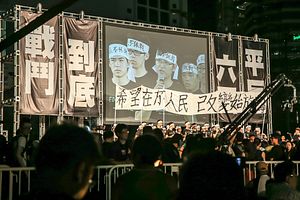HONG KONG – June 4th, 2016, will mark the 27th anniversary of the Tiananmen Square Massacre of 1989, otherwise known as the June Fourth Incident. In April of 1989, student activists marched toward Beijing’s Tiananmen Square as a mark of respect for the passing of former Communist Party General Secretary Hu Yaobang, a liberal reformist who was deposed by the party’s hardliners. At the time, China was facing severe inflation, limited career prospects, and perceived corruption of senior officials. The commemoration soon led to a sit-in protest in the iconic square, with calls for government accountability, freedom of the press, and freedom of speech.
The protests ultimately came to a heart-wrenching halt when the Chinese People’s Liberation Army rolled over students with armored tanks. It is estimated that close to 1,000 lives were lost, including civilians as well as soldiers and police.
For the past 26 years Hong Kong has been one of the very few territories within the sphere of China that has commemorated the protests. Each year on June 4, a candlelight vigil is held at Hong Kong’s Victoria Park. The event is organized by the Hong Kong Alliance in Support of Patriotic Democratic Movements in China with the support of various student unions. The Hong Kong Federation of Students has traditionally seen themselves as torchbearers for China’s democratic movement. A bond was forged by the students of Beijing and the student unions of Hong Kong in 1989, with the latter sending supplies to the mainland.
However, this year will see the departure of the Hong Kong Federation of Students, the city’s oldest and largest student group, from the commemoration ceremony.
This decision to boycott the protests comes at a time when localist sentiments have been on the rise, along with an increasingly loud call for self-determination. Political tensions within democracy groups have also become apparent since the 2014 Occupy protests, when students and large swathes of the general public peacefully occupied the main arteries of Hong Kong’s Central Business District for 79 days, punctured by several acts of violence perpetrated by the police force that shocked Hong Kong.
Paul Liu Chun-sing, an executive member of the Hong Kong Federation of Students, believes the Occupy protests (also known as the “Umbrella Revolution”) triggered a change in attitudes toward not only the commemoration vigil, but also toward Hong Kong as a Chinese city.
“It’s the sense of helplessness. We sat there for 79 days, and we achieved nothing,” Liu told the South China Morning Post. “After the Umbrella Revolution, I completely gave up my identity as a Chinese. I don’t think we need to fight for the ‘political fruits’ for a different race that always invades us.”
“We don’t see the necessity or the obligation to fight for anything on behalf of other ethnicities, outsiders. Instead, I think it is much more practical to strive for democracy for Hong Kong,” said Liu.
With the rise of the Chinese middle-class, an influx of cashed-up tourists came pouring across Hong Kong’s northern border and revealed the deep cultural and linguistic differences between the two ethnic Chinese populations, along with fears of Hong Kong’s “mainlandization.” Local residents felt their way of life was being affected, with stores increasingly catering to Chinese tourists amid rising rents verging on unaffordable.
The localist movement originated in the border towns of the New Territories closest to China proper, with Hong Kong’s local working-class population being the most vocal. What began as protests against grey market smuggling of goods north across the border soon turned ugly with frequent violent clashes. Eventually this gave rise to what is now known as “localism” and the political party known as Hong Kong Indigenous.
Wang Dan, one of the most prominent student leaders during the 1989 Tiananmen Square protests, has expressed his concern over the developments in Hong Kong. He said that the June 4 event has always been more than just remembrance ceremony. The vigil is a symbol of Hong Kong’s fight for freedom, preservation of the city’s autonomy, and the locals’ rights and benefits, Wang told the Hong Kong Economic Journal.
However, the student unions of almost all local universities have pledged to boycott this year’s vigil.
































